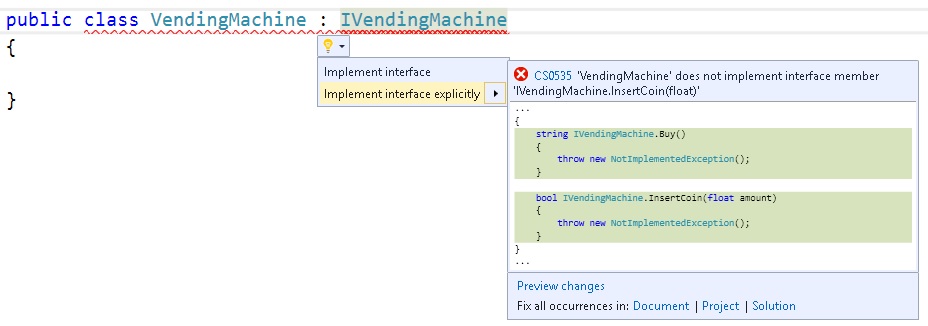Explicit Interface Implementation
Let’s imagine that you have a class with two methods:
public class VendingMachine
{
public bool InsertCoin(float amount)
{
if (amount < 500)
{
return false;
}
return true;
}
public string Buy()
{
return "Buy";
}
}
Now when we want to create an instance of this class and call one of those methods, it executes as expected:
VendingMachine machine = new VendingMachine();
machine.InsertCoin(5); // false
machine.Buy(); // "Buy"
Now suppose that we have an interface called IVendingMachine that has two methods:
public interface IVendingMachine
{
bool InsertCoin(float amount);
string Buy();
}
We want our class to implements this interface:
public class VendingMachine : IVendingMachine
{
public bool InsertCoin(float amount)
{
if (amount < 500)
{
return false;
}
return true;
}
public string Buy()
{
return "Buy";
}
}
Our class satisfied the interface because it has the methods with the same names. So Visual Studio doesn’t give you a compiler error. Now let’s imagine that we
also want to add interface’s methods to this class, So, in this case, we must explicitly prefix the methods with IVendingMachine.:
public class VendingMachine : IVendingMachine
{
public bool InsertCoin(float amount)
{
if (amount < 500)
{
return false;
}
return true;
}
bool IVendingMachine.InsertCoin(float amount)
{
if (amount < 300)
{
return true;
}
return false;
}
public string Buy()
{
return "Buy";
}
string IVendingMachine.Buy()
{
return "IVendingMachine Buy";
}
}
Note that Visual Studio can help you to implement interface explicitly by pressing Ctrl + . on the name of the interface and select Implement interface explicitly:
 Now, what happens when we call the `InsertCoin` and `Buy` methods? In this case, we should consider two different situations when we create the object:
Now, what happens when we call the `InsertCoin` and `Buy` methods? In this case, we should consider two different situations when we create the object:
- Concrete Type
- Interface Variable
If we want the methods of VendingMachine we should create the object with concrete type:
VendingMachine machine = new VendingMachine();
machine.InsertCoin(5); // false
machine.Buy(); // "Buy"
If we want the methods of IVendingMachine we should create the object with interface variable:
IVendingMachine machine = new VendingMachine();
machine.InsertCoin(5); // true
machine.Buy(); // "IVendingMachine Buy"